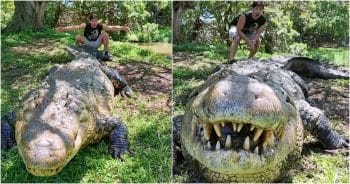Henry, the oldest known crocodile in the world, is marking an extraordinary milestone this year as he turns 124 years old. The celebration is taking place at the Crocworld Conservation Centre in Scottburgh, South Africa, where Henry has been a star resident since 1985. Originally captured in Botswana’s Okavango Delta in 1903, Henry is a Nile crocodile (Crocodylus Niloticus) whose long life has made him a symbol of resilience and longevity.
Crocworld Conservation Centre/Facebook
Despite the lack of precise records on his birth, Crocworld staff estimate he was born around the year 1900, choosing December 16 as the annual day to honor him. Since settling into his life at the conservation center nearly 40 years ago, Henry has thrived in his environment.
Over the decades, he has fathered more than 10,000 offspring, sharing his habitat with multiple female crocodiles. His massive size — measuring 16.4 feet (5 meters) long and weighing 1,540 pounds (700 kilograms) — places him on the larger end of the spectrum for his species.
“Whether he’s 100 or 130, we don’t really know,” said Steven Austad, a biologist who studies animal aging at the University of Alabama, in an interview with Live Science. “An age of 124 is not inconceivable for a crocodile.”
Reptiles like Henry are renowned for their impressive lifespans. As Austad explains, larger animals generally live longer, but reptiles surpass many other creatures of a similar size when it comes to longevity. A major factor lies in their cold-blooded nature, which allows them to conserve energy more efficiently than warm-blooded mammals. “A crocodile that was the same size as a person would only need to eat about 4% as much as a mammal like us,” Austad noted.
Crocworld Conservation Centre/Facebook
Unlike many other animals, crocodiles do not stop growing as they age, and their increasing size offers protection from predators. Henry’s life in captivity has also played a significant role in his longevity, ensuring he remains well-fed, safe, and shielded from disease or accidents. “Animals that, for whatever reason, happen to live in a safe environment, tend to live longer,” Austad added.
Crocodiles are also biologically unique in how they age. Unlike many vertebrates, they do not exhibit a noticeable decline in physical function over time. Researchers believe several factors may contribute to this — including proteins in Nile crocodile blood that could have antibacterial properties, enhancing their ability to resist infections. Another theory suggests that their gut microbiomes might bolster their immune systems, further contributing to their extended lifespans.
Studying animals like Henry, however, presents challenges. To fully understand their aging process, scientists would need to track crocodiles from infancy through their entire lives — a difficult feat considering the extraordinary longevity of these creatures. As Austad aptly put it, “[Crocodiles] live longer than the careers of the scientists studying them.” Happy Birthday, Henry! Here’s to many more! There are two amazing videos starring Henry below. Enjoy!
Please ‘SHARE’ to pass on this story to a friend or family member
Click ‘SHARE’ below to pass this along to a friend or family member
The post Giant Croc Who Has Sired 10,000 Babies Celebrates 124th Birthday appeared first on iHeartDogs.com.

